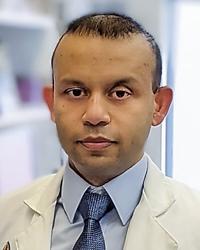Research Lab Results
-
Steven Menez Lab
Dr. Menez and his laboratory are interested in clinical and translational acute kidney injury (AKI) research, specifically with a focus on the transition between AKI and chronic kidney disease (CKD). Dr. Menez has investigated novel approaches to evaluate AKI using biomarkers of kidney injury, inflammation, and repair in the multi-center TRIBE-AKI and ASSESS-AKI Studies. Dr. Menez collaborates nationwide through the NIDDK-sponsored Kidney Precision Medicine Project, with a goal to improve the global understanding of kidney disease subgroups and identify new pathways and targets for novel therapies.
Since the start of the COVID-19 pandemic, he has additionally investigated the impact of COVID19 on kidney health, including short-term outcomes including need for dialysis or in-hospital mortality, as well as longer-term outcomes post-hospital discharge.
-
Stivers Lab
The Stivers Lab is broadly interested in the biology of the RNA base uracil when it is present in DNA. Our work involves structural and biophysical studies of uracil recognition by DNA repair enzymes, the central role of uracil in adapative and innate immunity, and the function of uracil in antifolate and fluoropyrimidine chemotherapy. We use a wide breadth of structural, chemical, genetic and biophysical approaches that provide a fundamental understanding of molecular function. Our long-range goal is to use this understanding to design novel small molecules that alter biological pathways within a cellular environment. One approach we are developing is the high-throughput synthesis and screening of small molecule libraries directed at important targets in cancer and HIV-1 pathogenesis. -
Stuart C. Ray Lab
Chronic viral hepatitis (due to HBV and HCV) is a major cause of liver disease worldwide, and an increasing cause of death in persons living with HIV/AIDS. Our laboratory studies are aimed at better defining the host-pathogen interactions in these infections, with particular focus on humoral and cellular immune responses, viral evasion, inflammation, fibrosis progression, and drug resistance. We are engaged in synthetic biology approaches to rational vaccine development and understanding the limits on the extraordinary genetic variability of HCV.
-
Suchi Saria Lab
The Suchi Saria Lab, part of the Institute for Computational Medicine, explores topics within the fields of machine learning and computational statistics, with a focus on computational solutions for problems in health informatics. Our team investigates the applications of machine learning and computational statistics to domains where one has to draw inferences from observing a complex, real-world system evolve over time. We use Bayesian and probabilistic graphical modeling approaches to address the challenges that emerge with modeling and prediction in real-world temporal systems.
Principal Investigator
-
Sujatha Kannan Lab
The Sujatha Kannan Lab works to develop therapeutic strategies for preventing perinatal brain injuries from occurring during development. We use a unique combination of nanotechnology, animal model development and in vivo imaging to better understand the mechanism and progression of cellular and metabolic conditions that lead to perinatal brain injury, with a focus on autism and cerebral palsy. -
Suman Paul Laboratory
At the Suman Paul laboratory, we are focused on developing new antibodies and cell therapies for cancer treatment. Our team of researchers are dedicated to identifying novel targets, mechanisms for cancer therapy and developing innovative solutions to improve patient outcomes. We work closely with basic science researchers and clinicians to accelerate the translation of our discoveries into clinical practice. -
Supendymoma and Ependymoma Research Center
The Johns Hopkins comprehensive Subependymoma and Ependymoma Research Center divideS its efforts into three areas: basic science, translational research and clinical practice. Each division works separately but shares findings and resources openly with each other and our collaborators. The goal of our united efforts is to optimize current treatments to affect the care received by patients with subependymomas and ependymomas. Also, our clinical, translational and basic science teams work to develop novel therapies to improve and extend the lives of those with these rare tumors. -
Susan Michaelis Lab
The Michaelis Laboratory's research goal is to dissect fundamental cellular processes relevant to human health and disease, using yeast and mammalian cell biology, biochemistry and high-throughput genomic approaches. Our team studies the cell biology of lamin A and its role in the premature aging disease Hutchinson-Gilford progeria syndrome (HGPS). Other research focuses on the core cellular machinery involved in recognition of misfolded proteins. Understanding cellular protein quality control machinery will ultimately help researchers devise treatments for protein misfolding diseases in which degradation is too efficient or not enough.
-
Susan Tuddenham Lab
The Susan Tuddenham Lab studies sexually transmitted diseases, in particular ocular syphilis.
-
Suzanne Jan de Beur Lab
Researchers in the Suzanne Jan de Beur Lab are interested in bone and mineral metabolism, endocrinology and osteoporosis. In addition, we focus on hormonal regulators of phosphate homeostasis, parathyroid hormone signaling and the molecular basis of hypophosphatemic disorders.




